A long time ago, in a small town far, far away…
My first love (his name is Tim, because there are a limited number of men’s names in my personal history of love and friendship) found someone else over the summer, a girl from a nearby military post. This often happened when a new batch of Army families moved in–they brought pretty teenage daughters with them. So my hero, the boy who’d been the center of my life, my beautiful, motorcycle-riding, leather-jacket-with-fringe-wearing, blond-haired, green-eyed Tim, broke up with me just before my sophomore year in high school. The Other Girl (whose real name I’m stealing for a character because I like it), was not in school the first six weeks of that year. She had mono.
For the first time, upperclassmen could choose our English courses in six-week modules from several topics, which meant that sophomores through seniors might end up in the same classes. That’s why Lynne and I shared an English class with Tim and my friend Riley, though they were older than we were. Riley and Lynne would watch with rolling eyes as Tim sat behind me and played with my long hair, braiding and unbraiding it, or rubbed the back of my neck with his thumbs, or leaned forward and whispered nice things to me during class. They rolled their eyes because once we walked out of English, where people who knew The Other Girl might see us, Tim ignored me. And I let him get away with it.
Those were the most miserable six weeks of my young life–not just because of the romantic roller coaster, but because an expiration date loomed. My parents were moving to a community a few miles away, where my father was the assistant principal of the high school. They couldn’t wait to transfer me there, in no small part to get me away from Tim. The big breakup wasn’t enough for them; they also wanted inaccessibility. It was as if they had a camera in my English class.
Looking at photos of myself from those months, I can still feel tears lurking. Even when I’m smiling, my eyes are pools of misery. There’s nothing quite so intense as the loss of a girl’s first love. When she’s also taken from all her friends and put in a new school where she feels different from everybody AND is the assistant principal’s kid–not a good time.
After I was transferred, Tim and The Other Girl broke up and he began calling me. Maybe it was a case of absence making his heart grow fonder. Since I didn’t have a driver’s license, and he wasn’t allowed to come to our new home, we devised a scheme to see each other one weekend. Lynne’s older sister would pick me up and take me to Lynne’s house to spend the night. Lynne and I were supposedly going to their high school football game. Lynne actually had a date, and the two of them were dropping me at the stadium before they went somewhere else. I’d be meeting Tim there, which would give us a chance to talk things out and reconcile before he took me back to Lynne’s that night.
I can still remember how I looked and what I wore that Friday. My hair was shiny and hung board-straight to my waist (it was the style). My makeup was light but applied to set off the big brown eyes Tim always complimented. I had on my favorite jeans and a new shirt that I loved. I took my brown suede jacket with me because of the chilly autumn night. Everything went according to plan…
Except that Tim never showed. I kept thinking maybe I got our meet-up place wrong, so I walked around the stadium during the whole game. Riley, who was a drummer in the band, watched from a distance, occasionally shaking his head but restraining himself from saying anything that might upset me more. When the game was over and the crowd was filing out around me, Riley went with the other drummers to put up their equipment. I didn’t move, sure that Tim would never stand me up. Finally Riley and his girlfriend Carol came back for me and made me leave with them.
I couldn’t go to Lynne’s, since she was supposed to be with me, and I sure wasn’t going home. Whatever their plans had been, Riley and Carol gave up their date that night to drive me around until I could meet Lynne. I was sitting in the back seat when Carol changed the radio station just as Carole King’s “So Far Away” began to play. I finally broke down in sobs, and I can still hear Carol saying, “Awwww. Riley! DO something!”
He couldn’t, of course. Sometimes you just have to let a friend’s heart break. And though it wasn’t the last time I’d have a broken heart, because it was the first time, I had no context for it. I didn’t know that I’d eventually get over it. I didn’t know that Tim and I would reunite and break up several more times before we both moved on. All I knew was that it felt like I was being turned inside out, my world was ending, and life would never be good again.
Though I never had teenage daughters of my own, my memories of being that naive and feeling that fragile–though of course, I actually had the strength and resilience of youth on my side–are sharp and fresh. Along with all the other versions of me I’d grow into over the years, that girl still lives inside me.
Maybe she’s the one who was so bewildered when I read Stephenie Meyer’s Twilight. I was genuinely reluctant to buy it. I even told the bookseller as much. Why? Because so many people have written such terrible things about it. Some people would say they liked the story but the writing was awful. Others would say the writing was passable but they still despised it and couldn’t fathom its success. I’m not going to get into more specific criticisms of the books. Anyone can find them on the Internet, and many of them were written by people who also write books, including people I know and whose books I read.
But the books are written for the very audience that Bella is part of: the adolescent girl. Bella is completely believable to me, with her insecurities, her stumbling attempts to do the right thing, her love-at-first-sight for exactly the wrong boy, her sense that the weight of the world rests on her young shoulders. Meyer makes Edward her protector, maddening though he may be. He adores her, he rescues her, he watches over her. Theirs seems a hopeless love, never to follow a normal course, perhaps never to be consummated. It’s safely dangerous love, and to Bella, her first love plays out on a sweeping, sometimes agonizing, sometimes thrilling scale.
So did mine, and Tim wasn’t even a self-sacrificing vampire.
Bella is every teenage girl who ever felt hopeless, passionate yearning for a rock star, or the school’s most popular jock, or a teacher, or a gay best friend. It’s exquisite torment, and again, someone as young as Meyer’s Bella has no context for her feelings other than what she might find culturally, for example, in movies or literature.
And all those young readers and moviegoers who are infatuated with Bella and Edward are doing the same–falling in love with a love story that’s set up to have a certain physical purity while packing lots of emotional drama.
I’m not sure why Meyer has been singled out as a bad writer by writers that other people have also ridiculed and belittled. Maybe Meyer’s novels aren’t to everyone’s taste, but are any of these sharp-tongued critics being forced to buy and read her books?
It delights me when I see young people reading. And if they are led by Bella and Edward to read Romeo and Juliet or Wuthering Heights or any other literary classics, how can this be a bad thing?
Finally, if it’s not Meyer’s writing which people find so objectionable, but the swooning, over-the-top reactions of adolescent girls and ‘tweens, I can’t help but think of girls’ frenzied reactions to Rudolph Valentino, Frank Sinatra, James Dean, Elvis Presley, the Beatles, Michael Jackson, Leonardo DiCaprio, to mention a few teen idols. Furthermore, in my life and certainly online, there are plenty of examples of people who exited their teenage years long, long ago, both male and female, who practically live in a ménage à trois with a couple of lovers named Angst and Drama.
So this is my confession. I read Twilight while I was reading Moby Dick, and I didn’t fall down dead from the literary dissonance. I was waiting to rent the Twilight DVD because a couple of other people said they might read the book, too, before watching the movie with me. But I couldn’t stand the wait. Not only did I buy New Moon and read it, but I dragged The Brides and Tom into my depravity by persuading them to watch Twilight last weekend. Today, I bought the last two books because I want to see how the love story of Edward and Bella plays out.
And I don’t feel one moment’s shame for any of this, because my heart remembers and celebrates that exquisite torment that is falling in love for the first time.
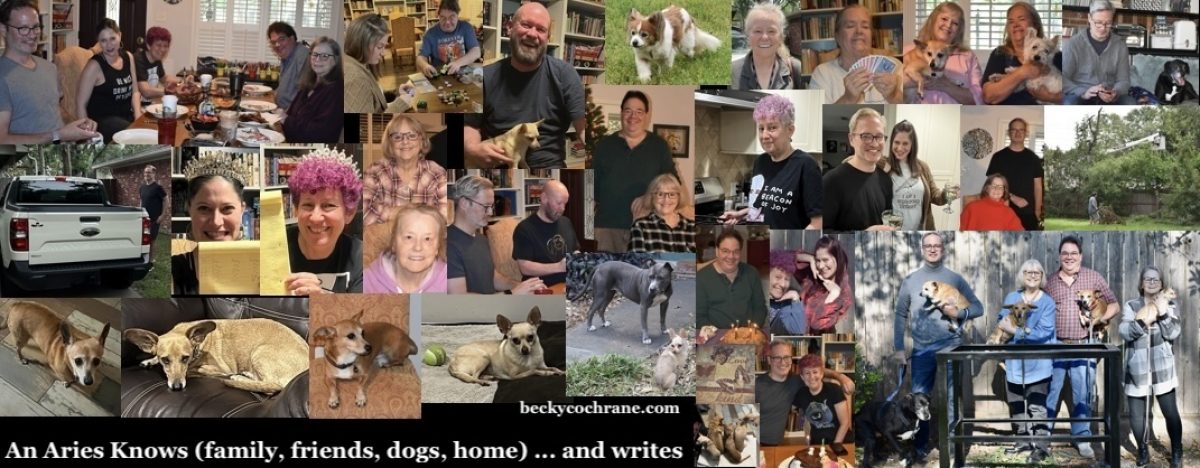
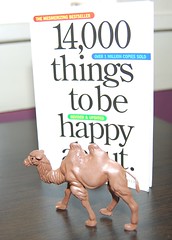


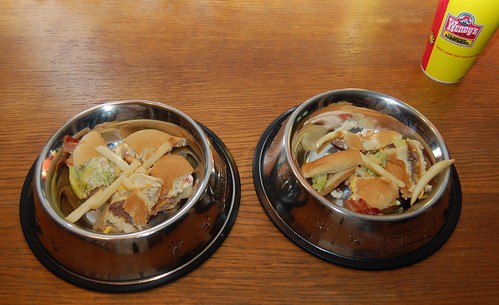

 Back in the dark ages, when Amy and I became new coworkers in the corporate world, she came up to me one day and was asking me something. I’m not very good at shifting focus, so I was probably being kind of non-responsive as I finished whatever I was working on. Whereupon Amy said, “Am I bugging you?” And at the same time, we both said, “I didn’t mean to bug ya!”
Back in the dark ages, when Amy and I became new coworkers in the corporate world, she came up to me one day and was asking me something. I’m not very good at shifting focus, so I was probably being kind of non-responsive as I finished whatever I was working on. Whereupon Amy said, “Am I bugging you?” And at the same time, we both said, “I didn’t mean to bug ya!”


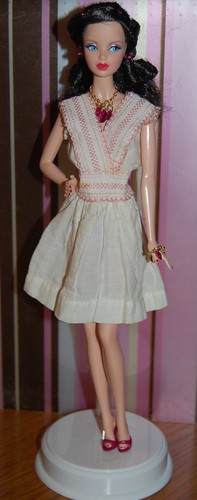

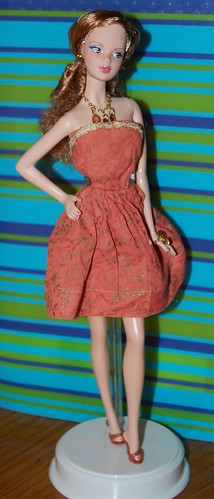
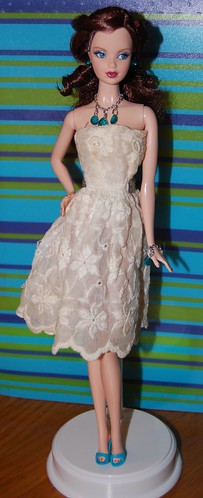

 It was different from all the other stores in the Bookstop chain. The people who worked there had a certain attitude–not quite as “customer-friendly” as the one trained into Bookstop employees in different stores. The attitude came with the neighborhood. Their customers seemed to expect and even like the rudeness, much as tourists crave the same from NYC cab drivers or the French. Such attitude gives us stories that usually end with a shake of the head and a slow smile of acceptance that we’ve joined a community of the skillfully insulted.
It was different from all the other stores in the Bookstop chain. The people who worked there had a certain attitude–not quite as “customer-friendly” as the one trained into Bookstop employees in different stores. The attitude came with the neighborhood. Their customers seemed to expect and even like the rudeness, much as tourists crave the same from NYC cab drivers or the French. Such attitude gives us stories that usually end with a shake of the head and a slow smile of acceptance that we’ve joined a community of the skillfully insulted.

